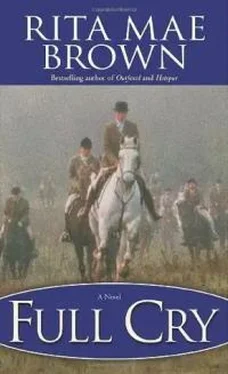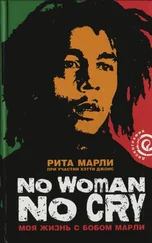Hounds circled the bottom of the ridge. On the Soldier Road side, they abruptly cut up the ridge on an old deer trail.
Lafayette effortlessly followed, his long stride making the ride comfortable.
Sister blew a few strangled notes when hounds first took off. Now she relied on her voice. She whooped and hollered, shouting as she and Lafayette began to climb to the top of the ridge.
Halfway up, they were enshrouded in a thick veil of white mist. By the time they reached the top, she could barely see fifty yards ahead of her. The heavy moisture in the low cloud felt clammy.
Onward and upward hounds roared. As they passed the hanging tree, they ignored the mournful spirits there. The wind rustled that strange low howl, whistling at a varying pitch just as Sister rode by. The hair on the back of her neck stood up. She thought she saw, out of the corner of her eye, the specter of a well-dressed eighteenth-century gentleman standing next to a Confederate veteran in full uniform.
“Balls,” she said out loud, and heard a ghostly snicker.
She loathed this place. Lafayette snorted. They galloped, clods of thawing turf flying up behind his hooves, to the end of the ridge, down the wide dirt road, the last road the convicted ever trod.
Then along the farm road—faster and faster, farther and farther—past the turn into her farm, hounds in the kennel making one hell of a racket, down the farm road, out to the tertiary road, the briefest of checks.
Sister dropped her head, then tipped it back, gulping air. She turned her head, looking back. Behind her, the clouds slid from the ridge, some fingering down the Blue Ridge Mountains as well. Weather was not just making its way in from the west, it was coming full throttle.
She saw Edward emerge at the bottom of the ridge, a dot in bright red.
“Cross the road,” Ardent sounded.
The others picked up the line where he’d found it, and on they flew on a southeast line. They shot through the tiny graveyard, marked only by an upright stone. Legend was this was the last stop for suicides who could not be buried in consecrated ground. No one knew for certain. Hounds kept running again, coming out on another tertiary road, the gravel spitting up beneath their claws as they dug in for purchase. The top of the road darkened as dew sank into the bluestone. Lafayette thundered across it, plunging into the rows of cornstalks, leaves making an eerie rustle as the wind picked up.
They were at Alice Ramy’s northernmost border. She left the corn up for wildlife every winter. Hounds reached the end of the cornfield, hooked left, and forded an old drainage ditch, snow filling the bottom.
Sister and Lafayette didn’t even look down. They flew over the wide ditch as though at the Grand National. A soft thud on the other side as they landed, Lafayette reached out with his forelegs and on they ran, now turning northward, then northeast. Again, they crossed the dirt road, over the meadows, into another wooded area, land mines of rock everywhere, tough soil.
Hounds stopped. Searched.
Sister stopped, hearing the hooves behind her about a quarter of a mile. She figured the drainage ditch held some of them up. God knew, Edward would fly over it.
Hounds moved at a slow, deliberate pace, trying to pick up the scent. The coyote, pausing for a breather on the rim of a ravine a half mile away, heard them, judged the distance between himself and the pack, then trotted toward After All Farm.
He crossed the paved highway, a two-way road with a painted center line, walked down a steep embankment, and then loped toward his den at the southern edge of After All Farm, not a third of a mile away.
Hounds found his line. By the time they reached the den, he was safely inside.
Sister dismounted, blew “Gone to Ground” with what wind she had left. She studied the tracks. “Knew it, god-dammit.”
“Well, we knew they were here.” Betty, who had swung in, looked down.
“What a pity.” Sybil, also joining the pack, face cherry red, mourned.
“If we’re very lucky, they won’t run off our foxes. Still, I think we should shoot every damned one of them.” Sister bore no love for the coyote.
“Yeah,” Betty agreed.
Edward, top hat firmly in place, red hat cord ensuring it wouldn’t be lost, relaxed his shoulders a moment.
“What a run,” Crawford enthused.
Coyote did give glorious runs, but the play by play was much simpler. It was the difference between high school football and the pros. The coyote didn’t use the ruses the fox did, and most dyed-in-the-wool foxhunters wanted to pit themselves against the cleverest of creatures. The coyote might be wily, but he wasn’t sporting like the fox.
Hounds, jubilant at putting their game to ground, sterns upright, eyes clear and happy, pranced as they packed in back to After All Farm.
“Girls won.” Cora laughed.
Asa, generous, conceded, then said, “After a go like that, I’d say we all won.”
“Yes, well done, youngsters,” Diana praised the firstyear entry, who beamed.
As the field walked back, clouds filling half the western sky, a little spit could be seen coming from them: more snow.
“Mercury’s taking a nose dive,” Betty mentioned.
Sybil hunched up her shoulders. “What a winter we’re having.”
“Was Gabriel Daniel Fahrenheit who first put mercury in a thermometer. Born in Poland in 1686. Just think how every day we are enriched by someone who went before us,” Sister mused.
“It is pretty wonderful.” Betty smiled.
“Bet you by the time we get to the covered bridge, snow will be falling there.” Sybil furrowed her brow.
Sister studied the western sky. “Yep.”
Shaker and Lorraine waited at the turnoff to After All Farm. He rolled down the window of the truck, stuck his thumb up.
Sister stuck hers up, too.
He rolled up his window and drove down to the trailers, less than a mile away. He wanted to be at the party wagon when hounds arrived.
Sam, on Cloud Nine, chatted with Gray and Tommy Cullhain. His horse, the timber horse, has a long stride, but he wasn’t paying attention.
The horse bumped Xavier’s paint horse, Picasso.
Xavier turned around, beheld Sam, and snarled, “Drop dead.”
“You first,” Sam fired back.
CHAPTER 32
A towering bouquet, winter greens interspersed with rich red and creamy white roses, stood majestically on Sister’s front hall table, a long narrow Louis XVI, its gold ormolu gleaming against the deep black lacquer.
Sister opened the note, which read, “Who says flowers don’t bloom in winter? Beautiful. Gray.”
Her right hand touched her heart for a second.
Golly sat behind them, a feline part of the display. “Patterson’s delivered.”
“Spectacular!” Sister exclaimed.
She loved flowers—what woman doesn’t? One of the small disappointments of age was that men did not seem to send them as regularly as they once did.
She took the stairs two at a time, stripped off her clothing. She always took off her boots in the stable, and the girls would clean them. She’d slip into her Wellies, cold in the winter, finish the chores, then come into the house.
She hopped in the shower, Raleigh and Rooster pressing their noses to the glass doors. Then she toweled off, fixed her hair, threw on makeup, opened the closet door, and uttered those immortal words, “I have nothing to wear.”
“How can she say that?” Rooster, having lived with a man, was just learning that women were different in some respects. He was only in his second year with Sister.
Raleigh, nosing a soft pair of leather shoes, answered, “Color, season, fabric, she has to worry about all of that and then when she picks the right thing, the shoes.” He rolled his eyes. “The downfall of women!”
Читать дальше












